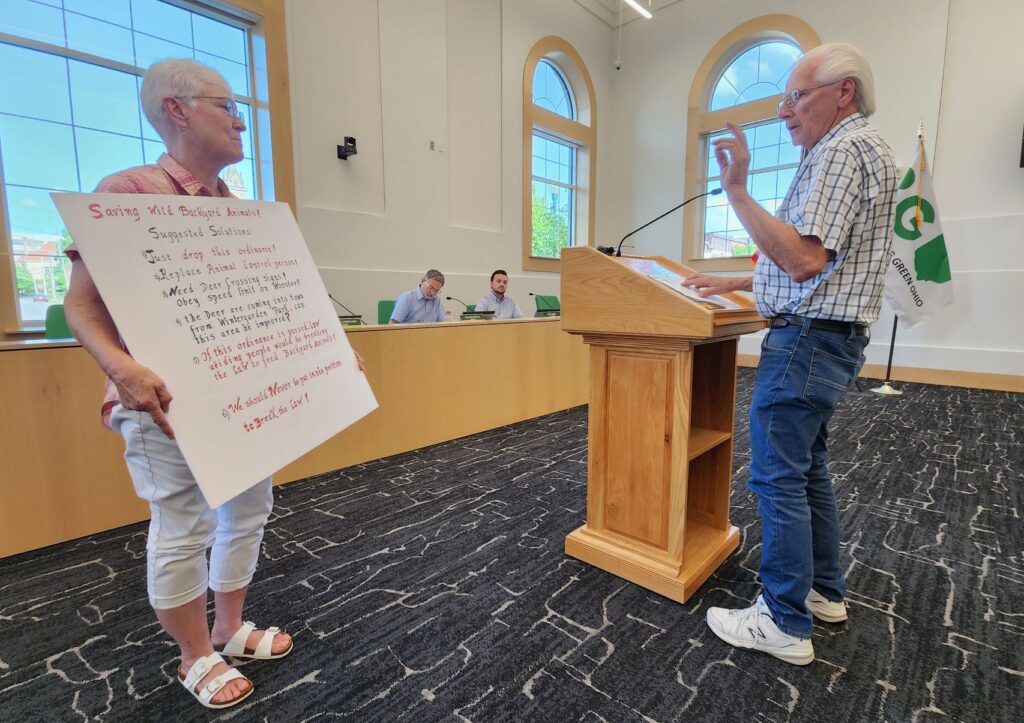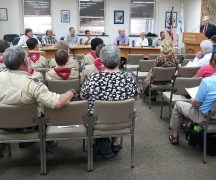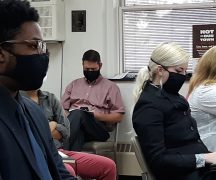By JAN McLAUGHLIN
BG Independent News
No cold turkey for the feeding of wildlife in the city of Bowling Green … well, except for deer and turkeys. Despite advice from wildlife specialists, residents will still be able to provide feed for other wild animals to squirrel away.
Bowling Green City Council voted Monday evening to take a more measured approach to rein in residents’ feeding of wild animals.
The final version of the ordinance was pared down from the original version, after many residents voiced their objections. Among the changes approved are:
- Residents will be prohibited from feeding deer and turkeys on their properties, since those animals are the ones causing problems. Feeding of other wild animals will not be affected including squirrels, chipmunks, groundhogs, raccoons, skunks, opossums, muskrats, foxes and coyotes.
- The feeding prohibitions will not cover loose pets, such as cats and dogs.
- The ordinance affects only those people who “intentionally” feed deer and turkeys. If those animals eat from bird feeders intended for songbirds, there is no violation.
- People who have plants in their gardens or landscaping that deer or turkeys eat, the residents are not in violation of the ordinance.
Council member Jeff Dennis introduced the new wording Monday evening that was accepted by council.
“As originally written, I believe this legislation is too broad,” Dennis said. “The feeding of deer and turkey has created a problem that is adversely impacting public and private property and can also be harmful to wildlife. However, I have not seen evidence that the other animals listed, or others that aren’t but would fall within the scope of this legislation, are currently a problem for my constituents.”
Bowling Green is seeing an overpopulation of some animals – “feeding animals drives that,” he said.
Like other council members, Dennis proposed council take a more incremental approach and address other forms of wildlife at a later date if education of city residents proves to be unsuccessful.
The amended wording states: No person shall knowingly feed, cause to be fed, or provide food for deer or turkeys on any private or public property within the boundaries of the city. Whoever violates this section is guilty of a minor misdemeanor. Each day that a violation continues shall be deemed a separate offense.
The lone vote against the amended ordinance came from Greg Robinette, who said he would prefer that the proposal be voted down so the issue could be studied more thoroughly. While some regulations may be necessary, Robinette suggested that the city focus on education of the public first.
Council member Joel O’Dorisio said he had heard from many constituents on the issue. While he felt the original ordinance went too far, he said he could support the version restricted to deer and turkeys. “This makes it more palatable.”
Council member Bill Herald said he was in favor of the incremental approach, while the city can continue to research the issue and educate residents.
Council President Mark Hollenbaugh noted that city residents have repeatedly come to council with concerns about the deer population.
Council member Rachel Phipps said she attended the city’s transportation and safety committee meeting where issues with wildlife were discussed. Education is key, she said, “on how to coexist with wildlife in our community.”
Council member Damon Sherry also attended the transportation and safety meeting, and said he has received several emails on the ordinance from his constituents. Now that the definition of wildlife is being narrowed down to deer and turkeys, he could support the law.
Citizens again voiced their support and objections to the ordinance during Monday’s meeting.

Richard and Maxine Beaverson returned to City Council with more than 250 signatures of city residents opposed to the ordinance. He suggested the city get an animal control employee, post deer crossing signs on West Wooster Street, improve Wintergarden Park for deer, or just drop the ordinance altogether.
Beaverson added the people who signed the petition said this would be an unnecessary law, that people ought to live in harmony with animals, and that the city should focus on education, not creating more laws.
Bruce Kidder also spoke against the ordinance, saying that landscaping damage by animals is not the responsibility of city government.
“City Council is not a homeowners association,” Kidder said. “Don’t use that as an excuse.”
Wild animals in Bowling Green are encouraged by all the trees and tall grasses, he added.
Kidder warned that people will not get rid of salt blocks or water in baby pools for deer.
“We don’t want to go there as a city,” he said.
The issue of wild animals came to a head last year after some turkeys, accustomed to people feeding them, became aggressive with people outside Wood County Hospital, and with residents and mail carriers in some neighborhoods.
Katelyn Elliott, who spoke in favor of the revised ordinance, also voiced her support in a letter.
“I have two children. One is 4, one has disabilities and uses a wheelchair. I don’t think either one of them could fight off a wild turkey. They should not have to,” she said.
The Ohio Department of Natural Resources gave the city a lengthy list of the dangers to wildlife posed by feeding. It can change animal behavior and prevent young animals from learning to properly forage resulting in reliance on humans. It leads to an unnatural concentration of animals and mixing of species which can lead to disease spread and aggressive competition for the easily available food.
“When people have been told by wildlife experts what they are doing is harmful to wildlife and they insist on continuing, I find it hard to believe they are doing it for any reason other than their own entertainment,” Elliott wrote. “The city does not have a responsibility to provide entertainment. It does have a responsibility to protect health and safety. The safety of people, property, and wildlife should take priority.”
City Communications Director Amanda Gamby has explained that complaints from residents are increasing about neighbors intentionally feeding wildlife. City officials have heard from residents annoyed with their neighbors who put out salt licks for deer, and peanuts in the shell for other animals.
The city is trying to encourage residents to “love them wild – leave them wild,” Gamby said.





